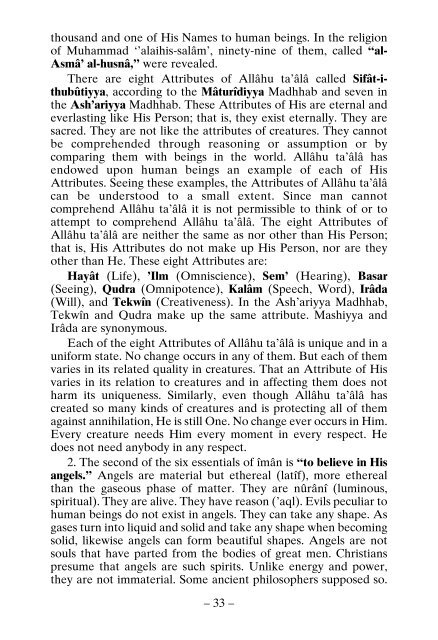Belief and Islam
BELIEF AND ISLAM star This work, Belief and Islam, originally was written in Persian under the title I’tiqâd-nâma by Hadrât Mawlânâ Khâlid al-Baghdâdî, a profound ‘âlim of Islam and a specialist in ma’ârif of tasawwuf. Hâji Faydullah Effendi of Kemah, a khalîfa of great walî Mavlânâ Mahmûd Sâhib, the brother of the author, translated the book into Turkish and named it Farâid-ul-fawâid which was printed in Istanbul in 1312 A.H.[1894]. Our bookstore had it translated again from the Persian original into Turkish and, some explanations and three chapters, published it with the title Imân ve Islâm in 1966. German, French and Arabic versions are also published by our bookstore. This book, explains five fundamentals of Islam, six fundamentals of îmân and the contemporary information about the matter and refutes those who are against Islam and those who are lâ-madbhabî.
BELIEF AND ISLAM
star This work, Belief and Islam, originally was written in Persian under the title I’tiqâd-nâma by Hadrât Mawlânâ Khâlid al-Baghdâdî, a profound ‘âlim of Islam and a specialist in ma’ârif of tasawwuf. Hâji Faydullah Effendi of Kemah, a khalîfa of great walî Mavlânâ Mahmûd Sâhib, the brother of the author, translated the book into Turkish and named it Farâid-ul-fawâid which was printed in Istanbul in 1312 A.H.[1894]. Our bookstore had it translated again from the Persian original into Turkish and, some explanations and three chapters, published it with the title Imân ve Islâm in 1966. German, French and Arabic versions are also published by our bookstore. This book, explains five fundamentals of Islam, six fundamentals of îmân and the contemporary information about the matter and refutes those who are against Islam and those who are lâ-madbhabî.
You also want an ePaper? Increase the reach of your titles
YUMPU automatically turns print PDFs into web optimized ePapers that Google loves.
thous<strong>and</strong> <strong>and</strong> one of His Names to human beings. In the religion<br />
of Muhammad ‘’alaihis-salâm’, ninety-nine of them, called “al-<br />
Asmâ’ al-husnâ,” were revealed.<br />
There are eight Attributes of Allâhu ta’âlâ called Sifât-ithubûtiyya,<br />
according to the Mâturîdiyya Madhhab <strong>and</strong> seven in<br />
the Ash’ariyya Madhhab. These Attributes of His are eternal <strong>and</strong><br />
everlasting like His Person; that is, they exist eternally. They are<br />
sacred. They are not like the attributes of creatures. They cannot<br />
be comprehended through reasoning or assumption or by<br />
comparing them with beings in the world. Allâhu ta’âlâ has<br />
endowed upon human beings an example of each of His<br />
Attributes. Seeing these examples, the Attributes of Allâhu ta’âlâ<br />
can be understood to a small extent. Since man cannot<br />
comprehend Allâhu ta’âlâ it is not permissible to think of or to<br />
attempt to comprehend Allâhu ta’âlâ. The eight Attributes of<br />
Allâhu ta’âlâ are neither the same as nor other than His Person;<br />
that is, His Attributes do not make up His Person, nor are they<br />
other than He. These eight Attributes are:<br />
Hayât (Life), ’Ilm (Omniscience), Sem’ (Hearing), Basar<br />
(Seeing), Qudra (Omnipotence), Kalâm (Speech, Word), Irâda<br />
(Will), <strong>and</strong> Tekwîn (Creativeness). In the Ash’ariyya Madhhab,<br />
Tekwîn <strong>and</strong> Qudra make up the same attribute. Mashiyya <strong>and</strong><br />
Irâda are synonymous.<br />
Each of the eight Attributes of Allâhu ta’âlâ is unique <strong>and</strong> in a<br />
uniform state. No change occurs in any of them. But each of them<br />
varies in its related quality in creatures. That an Attribute of His<br />
varies in its relation to creatures <strong>and</strong> in affecting them does not<br />
harm its uniqueness. Similarly, even though Allâhu ta’âlâ has<br />
created so many kinds of creatures <strong>and</strong> is protecting all of them<br />
against annihilation, He is still One. No change ever occurs in Him.<br />
Every creature needs Him every moment in every respect. He<br />
does not need anybody in any respect.<br />
2. The second of the six essentials of îmân is “to believe in His<br />
angels.” Angels are material but ethereal (latîf), more ethereal<br />
than the gaseous phase of matter. They are nûrânî (luminous,<br />
spiritual). They are alive. They have reason (’aql). Evils peculiar to<br />
human beings do not exist in angels. They can take any shape. As<br />
gases turn into liquid <strong>and</strong> solid <strong>and</strong> take any shape when becoming<br />
solid, likewise angels can form beautiful shapes. Angels are not<br />
souls that have parted from the bodies of great men. Christians<br />
presume that angels are such spirits. Unlike energy <strong>and</strong> power,<br />
they are not immaterial. Some ancient philosophers supposed so.<br />
– 33 –

















